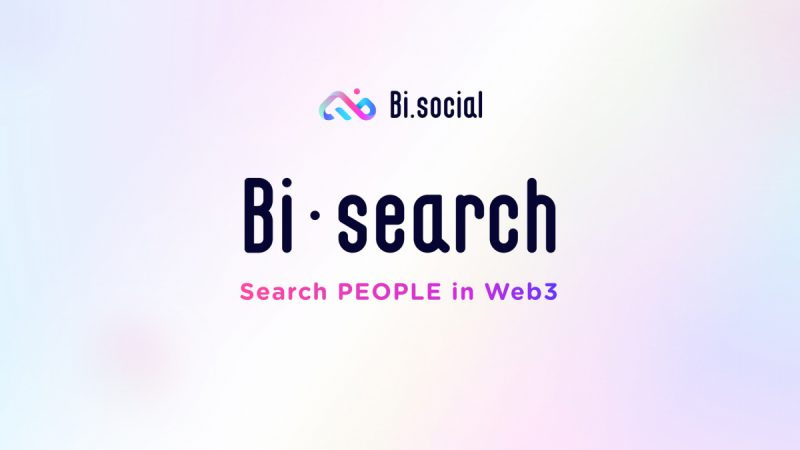With the Internet evolving, the speed and scale of information collection and distribution have reached an unprecedented level, and the explosion of information has forced us to adopt massive information management tools. This has led to the emergence of search engines, which allow users to access effective information quickly and precisely through retrieval and analysis.
In the Web 2.0 era, the emergence of social networks allows search engines to track users’ paths and analyze their preferences and social graphs, thus offering more accurate search results as well as intelligent recommendations. However, user data was dispersed across those platform silos, which were isolated from one another.
Web3 embodies an entirely new distributed network infrastructure, where native crypto wallet accounts become the mandatory path for users to access the Web3 world. All of the on-chain data can be traced back to specific wallet addresses, and every address is the identity of a specific person in the Web3 world. In this unified network, the barriers of data are broken down, and data could flow freely attached to wallet addresses.
The core logic of Web3’s upcoming creation of a new paradigm for information networks is Identity-oriented Data Structure.
During the 2021 bull market, 100 million users rushed into the crypto space in only four months, contributing to a sharp increase in overall crypto users from 100 million to 200 million. However, these 200 million crypto users still mainly rely on Web2 social networks to interact, such as Twitter or Discord. It’s partially because in the web3 native space, each user exists as an address string, which cannot be utilized directly and effectively. This situation is just like the chaos caused by massive amounts of information in the early stages of the Internet.
The data processing rules based on the units of wallet accounts will become the basic principle for structuring data in Web3, and furthermore, for building a people-oriented information architecture.
Using Bi Search, search for crypto natives on Web3
Bit islands officially launches the People Search feature (Alpha) in order to build a people-oriented information architecture for Web3. Using Bi Search, it is possible to search for Web3 natives by wallet addresses. The search result is no longer a string of complex codes but a clear display of users’ personal profiles, including their assets, digital collections, interacting paths, networking, and many other dimensions.
In the future, it will gradually support more Web3 identities such as DID, domain names, and Web2 accounts as well, such as email addresses and Twitter handles. This is a crucial step in the journey of Bit islands to build complete Web3-native social networking services after the launch of Bi Space.
The launch of Bi Search will allow users to proactively seek and browse other users’ on-chain spaces/homepages, enabling Web3-native social interactions and connections. Through such native interactions, the neurons of Web3-native social networks will be activated. Therefore, Web3-native social networks and natives will emerge naturally.
Two Key Features of Bi Search
1. Search for PEOPLE
Platforms like EtherScan provide transaction record inquiry services that are payment oriented.
Unlike this, based on interacting logic, Bit islands restructures on-chain data to show vivid and fleshed-out portraits of people. Users can browse the Web3-native social profiles of the search targets just like visiting the Web2 social pages, where they can get the personality intuitively, thereby creating further social connections.
2. Display Social Networks
Social networks are called networks because they connect people and form channels of interaction between them. Bit islands will not only allow pictures of the people represented by a certain address but also map the social network of the Web3 world by analyzing users’ on-chain interaction objects and behaviors. Users are no longer isolated individuals but become the hubs of the entire Web3 social network.
Usage Scenarios of Bi Search
1. Search by wallet addresses
When you want to know the details of a particular address, you can log onto Bi.social, enter the address in the search box, and access his or her Bi Space homepage. You could find his/her crypto assets, digital collections, on-chain social circle, etc.
2. Search by DIDs
When you only have someone’s ENS domain or other DID, you can also search directly. Bit islands will parse the DID and redirect to his/her Bi Space homepage.
3. Search by dApp accounts
When you find someone on OpenSea and want to know more about him/her, you can search for his/her OpenSea account on Bi Search. Bit islands will parse the account and redirect to his/her Bi Space homepage.
4. Search by Twitter accounts
When you have no information about any Web3 account or address of the search target, you can still search for his/her Twitter account on Bi Search. Bit islands will read the Web3 account and address information bound to that Twitter account and redirect to his/her Bi Space homepage.
Searching is the initial form people use when processing massive amounts of data. Searching in Web3 will be an intelligent information retrieval and analysis technology that is people-oriented and becomes more complex progressively.
In the near future, when we search for a token or an NFT, we may get information about certain holders, or even the portrait of all holders. And via searching and intelligent recommendation, we can also locate people with common interests in Web3, thus building some meaningful web3-native social circles.
Under more complex scenarios, by calculating people’s social reputation using search results, and by assisting dApps to prevent Sybil attacks, the people-oriented search engine will become an indispensable infrastructure in the Web3 world.
Based on the status quo of multiple chains co-existing in Web3, there are cases where one user has multiple addresses or avatars on different main chains. Bit islands will gradually support the search and integration of information on various main chains to provide users with seamless Web3 searching services.
In the long run, Bit islands will gradually support more Web2 and Web3 identities to establish an integrated Web3 hub that can seamlessly connect with any platform. With all social information gathered and distributed in the hub, Bit islands will drive those 4 billion Web2 social users to migrate to the Web3 world.
About Bit islands
Bit islands provide Web3-native social networking services. Unlike other social protocols or components that provide single functions, Bit islands is dedicated to building an integrated Web3-native social network. Based on users’ on-chain data, Bit islands focuses on native interacting scenarios, and provides a series of Web3 social features including Space, Search, DID, etc. Eventually, it will evolve into the largest social networking infrastructure and platform in the Web3 world. For more information, please visit the following official website.
Official website: https://app.social
Twitter link: https://twitter.com/Bitislands_
Discord server: https://discord.gg/bitislands
DISCLAIMER: This is a sponsored post.





